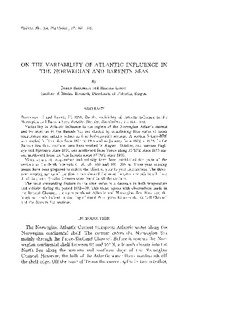| dc.contributor.author | Blindheim, Johan | |
| dc.contributor.author | Loeng, Harald | |
| dc.date.accessioned | 2008-12-05T11:53:38Z | |
| dc.date.issued | 1981 | |
| dc.identifier.uri | http://hdl.handle.net/11250/114444 | |
| dc.description.abstract | Variability in Atlantic influence in the regime of the Norwegian Atlantic current
and its branches in the Barents Sea are studied by establishing time series of mean
temperature and salinity values in four hydrographic sections. A section Svinøy-NW
was worked in December from 1951 to 1968 and in January from 1952 to 1973. In the
Barents Sea three sections have been worked in August-October, one between Fugløya and Bjørnøya since 1964, one northward from Vardø along 31°13'E since 1953 and
one northward from the Sem Islands along 37°20'E since 1956.
Mean values of temperature and salinity have been established for parts of the
sections in the depth intervals 0-50, 50-100 and 100-200 m. Three-year running
means have been prepared to reduce the effect of year-to-year fluctuations. The three-
year running means of the time series showed the same long-term trends in all three
depth intervals. Similar features were found in all the sections.
The most outstanding feature in the time series is a decrease in both temperature
and salinity during the period 1972-79. This trend agrees with observations made in
the Rockall Channel, the open northeast Atlantic and Norwegian Sea. However, the
longterm trends indicate a time lag of about three years between the Rockall Channel
and the Barents Sea sections. | en |
| dc.format.extent | 1105739 bytes | |
| dc.format.mimetype | application/pdf | |
| dc.language.iso | eng | en |
| dc.publisher | [Fiskeridirektoratets havforskningsinstitutt] | en |
| dc.relation.ispartofseries | Fiskeridirektoratets skrifter, Serie Havundersøkelser | en |
| dc.relation.ispartofseries | vol 17 no 4 | en |
| dc.title | On the variability of Atlantic Influence in the Norwegian and Barents Seas | en |
| dc.type | Research report | en |
| dc.source.pagenumber | s. 161-189 | en |
